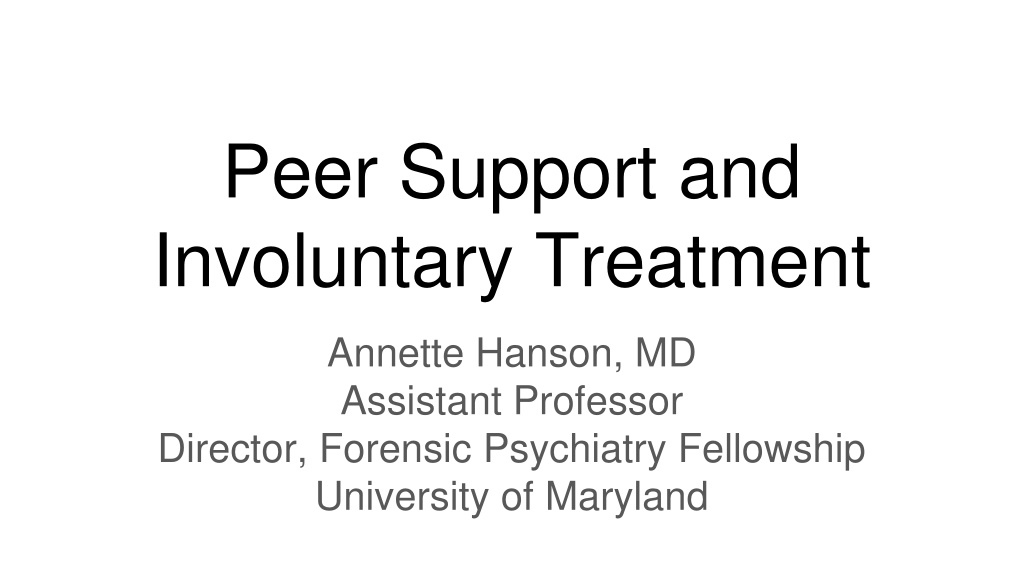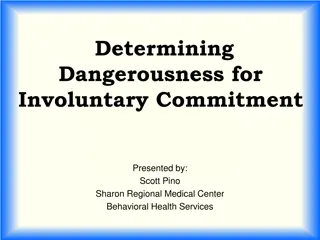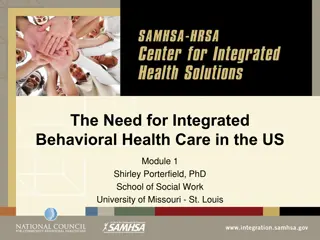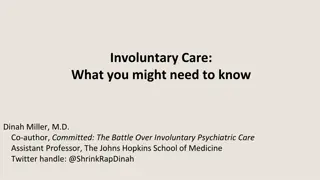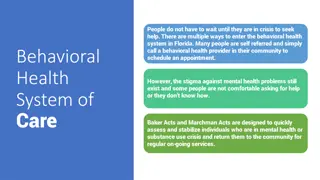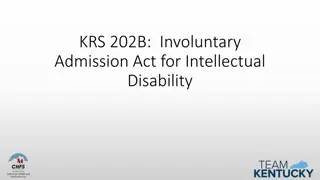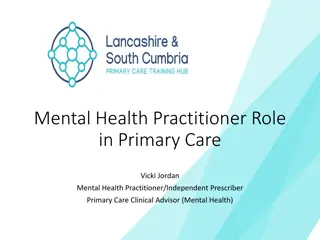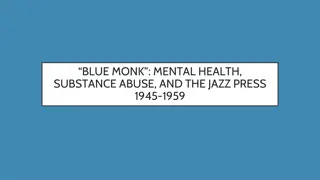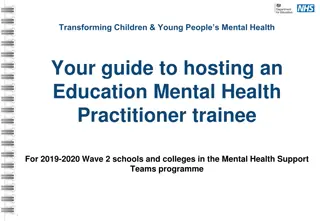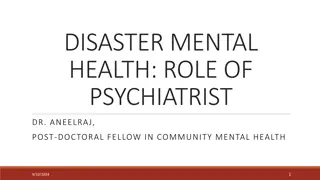Evolution of Involuntary Treatment in Mental Health Care
The evolution of involuntary treatment in mental health care spans from the 18th and 19th centuries marked by social reform efforts to present-day practices with common elements across states. Notable figures like Dorothea Dix and Mrs. E. P. W. Packard contributed to raising awareness and improving conditions for individuals with mental illness. The current mental health laws emphasize balancing the protection of society and the rights of individuals, including safeguards in civil commitment procedures. The history showcases a shift towards a more humane and structured approach to involuntary treatment in mental health.
Download Presentation

Please find below an Image/Link to download the presentation.
The content on the website is provided AS IS for your information and personal use only. It may not be sold, licensed, or shared on other websites without obtaining consent from the author. Download presentation by click this link. If you encounter any issues during the download, it is possible that the publisher has removed the file from their server.
E N D
Presentation Transcript
Peer Support and Involuntary Treatment Annette Hanson, MD Assistant Professor Director, Forensic Psychiatry Fellowship University of Maryland
Eighteenth and Nineteenth Centuries: Era of Social Reform
Dorothea Dix An 1841 visit to a Massachusetts jail lead to a national campaign to improve conditions for people with mental illness.
Mrs. E. P. W. Packard The subjection of the wife was the cure of the husband. The Prisoners Hidden Life, or Insane Asylums Unveiled (1868)
Where Were At Today All states have involuntary admission procedures with common elements: Statutory time limits Notice of hearing and rights Independent hearing (judicial or administrative) Right to call and confront witnesses Time-limited commitment Mandatory periodic review of commitment
Conclusion: Protect Society or Protect the Individual? Mental illness Addiction Intellectual disability Minority groups Prisoners
Preparation for Civil Commitment Health-General 10-613 et. seq. Application for admission Two certificates (valid for one week) Individual has a mental disorder Is a danger to the life or safety of self or others Requires inpatient care (no less restrictive alternative) Is unable or unwilling to be voluntarily admitted Must give patient a notice of rights Involuntary admission hearing within 10 days Right to appeal and six month review
Preparation for Civil Commitment During the observation period (after certs filed but before hearing), patient may sign in voluntarily at any time OR be discharged if not in need of admission Hearing is in the hospital, before an administrative law judge Patient has a right to have help from a lawyer Patient has a right to be present at the hearing May question people who testify Has a right to speak to the judge **Being committed does not mean medication can be given involuntarily unless there s an emergency**
Preparation for a Clinical Review Panel Medication can be given in an emergency if the patient is dangerous on the unit, but less intrusive interventions should be tried first Involuntary medication in a non-emergency can only be done after a person is civilly committed A clinical review panel is used to decide if medication can be be given The type of medication is decided by the panel, after considering input from the patient
Preparation for a Clinical Review Panel Health-General 10-708 et. seq. Two psychiatrist and a non-psychiatrist mental health professional Patient has a right to speak and ask questions Patient has a right to a lay advisor Patient has a right to know their diagnosis, and any risks, benefits, and side effects of the proposed treatment Panel must gather information about why treatment is refused and consider proposals from patient, including treatment alternatives
Preparation for a Clinical Review Panel Health-General 10-708 et. seq. Medication may be approved if patient is at risk of remaining both mentally ill and dangerous: 1. Due to symptoms that lead to admission, 2. Would be dangerous if released, 3. Would be at risk of being unable to care for basic needs CRP order must specify the names, doses, and frequency of any ordered meds and their alternatives Valid for 90 days Lay advisor gives notice of right to appeal and contact info for Legal Aid
Patient Rights and the Resident Grievance System
Patient Rights and the Resident Grievance System Protection and Advocacy for Individuals with Mental Illness Act (PAIMI) 42 U.S.C. 10801 et. seq. Civil Rights of Institutionalized Persons Act 42 U.S.C. 1997 et. seq. (1980) State Patient Bill of Rights Health-General 10-700
Health-General 10-700 Individualized treatment plan Freedom from restraints Written notice of rights Access to telephone, mail, visitors Vote and own property Clinical review panel Confidential records
Other Common Protections Clean and safe environment Freedom from physical or emotional abuse Freedom from discrimination Participation in religious services Exercise of other basic constitutional freedoms
Limitations Must be based on medical necessity Limitation documented in medical record, with basis for decision Decision must be reviewed every 30 days Examples: hospital security, protection of third party, protection from self-harm
The Resident Grievance System Rights advisor (10 days) Unit director (5 days) Resident rights committee (5 days) CEO (15 days) Central review committee (10 days) Pro bono legal services (MD Legal Aid) https://health.maryland.gov/yourrights/Pages/Resources.aspx Has list of rights advisors phone numbers and LAP for each facility To report complaints 1 (800) 747-7454
Final Advice Ask questions, you have a right to know what your doctor is thinking about Keep your own notes Don t be defensive and keep your temper in check Consider using a psychiatric advance directive Know your rights and exercise them
